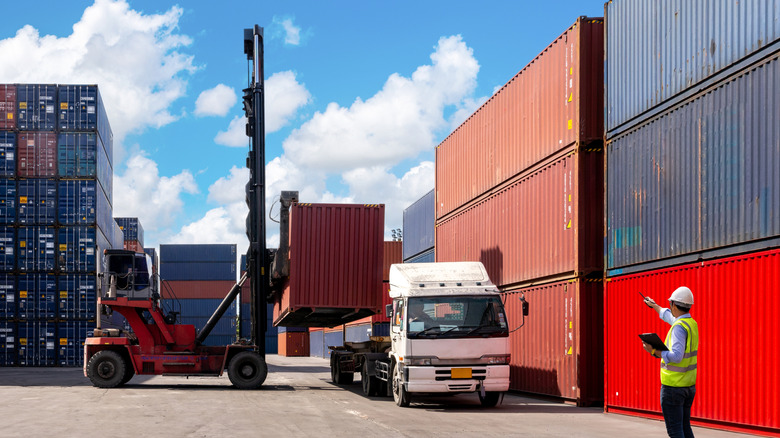What Impact Will Trump's Tariffs Have On The Job Market?
The whole country is bracing for the impact of Donald Trump's tariffs. Tariffs are import taxes, usually targeted on certain goods from certain countries. Trump has proposed increased targeted and across-the-board tariffs throughout his 2025 presidency campaign, and imposed tariffs in his first term. In theory, tariffs are meant to encourage domestic manufacturing and to make domestic goods more affordable than foreign imports. In practice, tariffs can actually drive up domestic prices, incur damaging tariffs made in retaliation from other countries, and even cost the U.S. many jobs.
Whether "Tariff Man" Trump truly believes the tariffs he's proposing for his second term as president will boost the domestic economy, or whether he simply enjoys wielding his power against American CEOs and economists to upend global trade, one thing is certain: Trump's tariffs are poised to impact the U.S. job market.
When the tariff hammer comes down, almost everybody is the nail. Ever since the end of World War II and the adoption of free trade policies, the nature of trade, manufacturing, labor, and the supply chain has become more global than protectionist and isolationist. Just like the many ways new tariffs will impact your family's budget, the imposition of new tariffs will affect entire industries and the local economies, businesses, jobs, and people those industries support. Some for the better, and many for the worse.
Some job creation and protection for direct-compete sectors
Some jobs may be protected by tariffs, if a domestic business is in direct competition with foreign importers. Consider the aluminum bleacher business. Mark McClelland is an aluminum manufacturer. McClelland's Texas-based company's aluminum bleacher products directly compete with imported products from other countries. In December 2024, McClelland told NPR: "They're selling at prices we can't compete with...it's going to shut down our industry if we don't do something." Tariffs could protect McClelland's business, and possibly even increase his company's job roster if an increased demand is made on domestic companies like his after tariffs on formerly inexpensive foreign products are imposed.
Fresh produce is another area that may see some job protection from tariffs. The United States has been slowly ramping imports of fresh fruits and vegetables since 2008. Mexico has long supplied fresh produce to the U.S. when it is out of season to grow in the States. But some Mexican produce, like blueberries, also compete with Georgia blueberries during the domestic growing season. Mexican blueberries can be cheaper than those domestically grown, so limiting such imports could protect some domestic food production jobs.
In 2018, during Donald Trump's first-term, 10-25% metal tariffs helped gain a few thousand jobs and reopen a handful of steel and aluminum plants. However, these jobs came at a cost: higher consumer prices for products containing imported metal components, like washing machines, as well as retaliatory tariffs, and job loss.
Complex impact and job loss
Donald Trump's tariff agenda seems in line with the Smoot-Hawley Tariff Act of 1930, which was a direct response to the 1929 stock market crash. Just like the Smoot-Hawley impact, Trump's tariffs could spark retaliation. Limiting imports ultimately means limiting exports. Plus, many sectors rely on inexpensive foreign components to conduct business. The strain of higher costs can crush small companies with thin profit margins, and make almost everything more expensive, to the pain of the domestic consumer and worker.
While you might want to buy certain items before tariffs take effect, the complex impact of tariffs on employment can't be as easily prepared for. Increased prices on goods and components from countries will impact domestic businesses large and small. In 2019, The Federal Reserve Board published findings on the affects of Trump's first-term tariffs on manufacturing. Per "Disentangling the Effects of the 2018-2019 Tariffs on a Globally Connected U.S. Manufacturing Sector," Trump's tariffs contributed to a 1.4% decrease in manufacturing jobs, equivalent to 175,000 jobs.
Tariffs can hold leverage, as Trump and his team suggest. Wielding punishing tariff rates might bring some negotiation power to the table, but may also make that table unattractive to manufacture in the U.S. While tariffs may cause domestic-based companies with global reach to move production, reshoring to the U.S. is not likely. Manufacturing jobs may in fact be created by tariffs, but lost to other low-wage, low-tariff countries.


